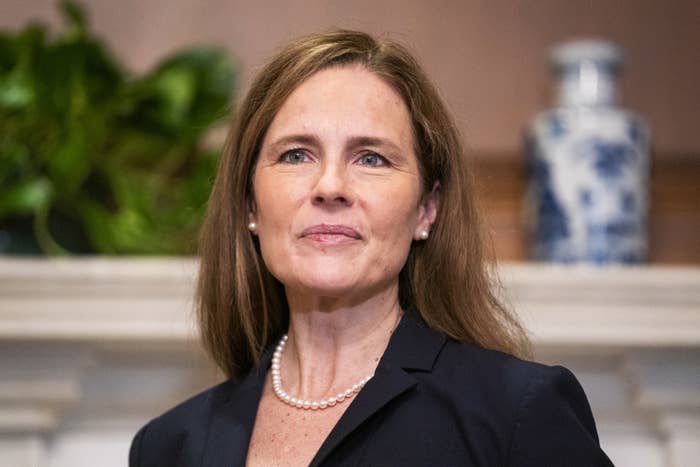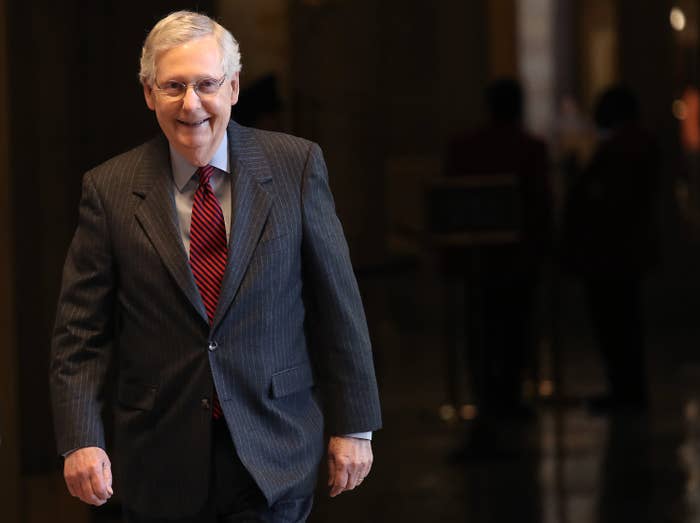
WASHINGTON — The Senate voted Monday to confirm Judge Amy Coney Barrett to the US Supreme Court, capping off a month of frantic activity by Republicans to seat President Donald Trump’s third nominee for the court just days before the election and cementing an even deeper conservative majority that could last for decades.
Barrett will join the nation’s highest court amid an election dominated by legal fights over how Americans vote during the coronavirus pandemic; the justices are currently considering cases affecting mail-in voting in North Carolina, Pennsylvania, and Wisconsin. She’ll also be sworn in two weeks before the court again considers the fate of the Affordable Care Act.
The Senate voted 52–48 to confirm Barrett, with one Republican, Maine Sen. Susan Collins, breaking ranks to join Democrats in opposing her nomination. The vote was a crowning achievement for Senate Majority Leader Mitch McConnell, who shepherded Barrett’s nomination through the Senate at a record pace to deliver on a pledge he made to fill the late justice Ruth Bader Ginsburg’s seat just hours after her death was announced on Sept. 17.
The vote came less than a week after the Senate Judiciary Committee sent Barrett’s nomination to the floor on Oct. 22, in a vote that took place despite a boycott by all of the committee’s Democratic members. McConnell began the final confirmation process the following day, keeping the Senate in session over the weekend to set up Monday’s final vote.
Supreme Court Justice Clarence Thomas swore Barrett in on Monday night at a Rose Garden ceremony outside of the White House. Trump announced Barrett’s nomination at a similar event in September, a likely superspreader event, after which Trump and several other White House staffers, top Republican politicians, and others tested positive for the coronavirus. A few hundred people attended Barrett’s swearing-in Monday night, according to a pool report, with most attendees wearing masks.
Barrett will take a separate oath, known as the "Judicial Oath," on Tuesday during a private ceremony at the Supreme Court with Chief Justice John Roberts Jr. After she takes that oath, she can officially start participating in cases, according to a statement from the court.
Barrett’s confirmation just a week before the election brings full circle Trump’s campaign promise in 2016 to dramatically reshape the federal judiciary with young, conservative judges. The court’s conservative-leaning members now outnumber the liberals 6–3. Justices now routinely serve into their eighties, setting the stage for the 48-year-old Barrett to shape American law for decades.
But it could be just days for Barrett’s influence to manifest — legal fights over how states are handling mail-in voting are pending before the court a week out from Election Day, and Trump has said he is “counting on” the Supreme Court to “look at the ballots.” Trump and former vice president Joe Biden have amassed teams of hundreds of lawyers and million-dollar legal budgets in anticipation of an election that winds up before the courts.
Barrett will also join the Supreme Court just in time to hear arguments on Nov. 10 in the latest major legal challenge to the Affordable Care Act. Republican state attorneys general, with the support of the Trump administration, are arguing that the individual mandate to have insurance is unlawful after Congress eliminated the financial penalty and that as a result, the entire law must fall. Asked about the case in a recent interview with 60 Minutes, Trump said, “I hope that they end it. It’ll be so good if they end it.”

At her confirmation hearings last week, Barrett tried to avoid taking firm positions on how she would rule in any election-related cases as well as on other hot button issues that will come before the court, including abortion, the Affordable Care Act, gun rights, and LGBTQ discrimination. Her answers did nothing to win over Democrats already wary of her solidly conservative record, first as a law professor and most recently as a judge on the US Court of Appeals for the 7th Circuit.
The court’s docket this fall also includes other blockbuster cases, including challenges to Trump’s plan to exclude undocumented immigrants from census data used to decide how many seats in Congress each state receives; his effort to divert defense dollars for border wall construction; and congressional Democrats’ fight to get grand jury materials from the Mueller investigation.
Barrett on Monday night reiterated that her personal views would not impact her work as a justice. She said that her Senate confirmation hearings, in which Democrats challenged her particularly on her views on Obamacare and abortion, had highlighted the difference for her between the elected and judicial branches of government.
"It is the job of a senator to pursue her policy preferences. In fact, it would be a dereliction of duty for her to put policy goals aside. By contrast, it is the job of a judge to resist her policy preferences. It would be a dereliction of duty for her to give into them," Barrett said. "Federal judges don't stand for election. Thus they have no basis for claiming that their preferences reflect those of the people."
Trump's campaign celebrated Barrett's confirmation in a statement, calling it "a reminder to millions of Americans why they voted for President Trump in the first place. She is now the third solid, conservative Justice appointed to the Supreme Court by the President and she will apply the Constitution and not turn the Court into a super legislature."
In her remarks at the White House after Trump announced her nomination on Sept. 26, Barrett made clear that her approach to judicial decision-making aligned with her mentor, the late justice Antonin Scalia, who was generally a stalwart vote in favor of Republicans in the big political fights that reached the court. She has embraced a legal theory known as originalism, which says that judges should interpret the Constitution based on what the “original” public meaning of a particular passage or phrase was when it was adopted.
“I clerked for the justice more than 20 years ago but the lessons I learned still resonate. His judicial philosophy is mine, too,” she said of Scalia. “A judge must apply the law as written. Judges are not policymakers and they must be resolute in setting aside any policy views they might hold."
Testifying before the Senate, Barrett insisted that her alignment with Scalia’s judicial philosophy did not mean she would rule exactly the same way that he would have — she noted that Scalia and Justice Clarence Thomas did not always agree even though they both subscribed to originalism.
If Biden wins the White House, Barrett’s confirmation ramps up pressure on his new administration to respond to calls from a growing number of liberal activists and congressional Democrats to explore structural changes to the Supreme Court to try to undercut the power of a 6–3 conservative majority. Democrats fear that even if they control the White House and both houses of Congress, the court will stand in the way of any major policy moves by a Biden administration.
Biden has resisted proposals for court-packing, which would involve expanding the number of justices, although in recent weeks he’s refused to take a firm position, saying he’ll wait to see what happens with Barrett’s nomination. Legal scholars and court watchdogs have also proposed imposing term limits on justices, although that would take longer to practically change anything at the court.
Barrett was one of Trump’s earliest federal appeals court nominees. The Senate voted 55–43 to confirm her to the 7th Circuit in late October 2017, mostly along party lines. She previously had spent the bulk of her career in academia, where her work focused on constitutional law and how courts go about interpreting federal laws.
Her focus on originalism, her stated opposition to abortion and the Affordable Care Act, and her bona fides within conservative legal circles — from her Scalia clerkship to her membership in the Federalist Society — made her a Supreme Court frontrunner from the start. Trump announced her as an addition to his nominee shortlist just over two weeks after she was confirmed to the 7th Circuit.
Born in New Orleans, Barrett earned her bachelor’s degree in English from Rhodes College in Memphis before landing at Notre Dame Law School. She came back to Notre Dame as a law professor in 2002 following prestigious clerkships and a few years working at private law firms and teaching. She is the only current justice who didn’t earn a law degree from Harvard or Yale.
Republicans repeatedly made a point of emphasizing Barrett’s Catholic faith, even as they preemptively criticized anyone who might make an issue of it during her confirmation fight; Democrats largely stayed away from it. Before becoming a judge, she’d signed public statements organized by her faith communities opposing abortion and marriage for same-sex couples. At her confirmation hearing, she said she would set aside her beliefs in deciding cases.
“For any issue that comes up, abortion or anything else, I’ll follow the law,” Barrett said.

